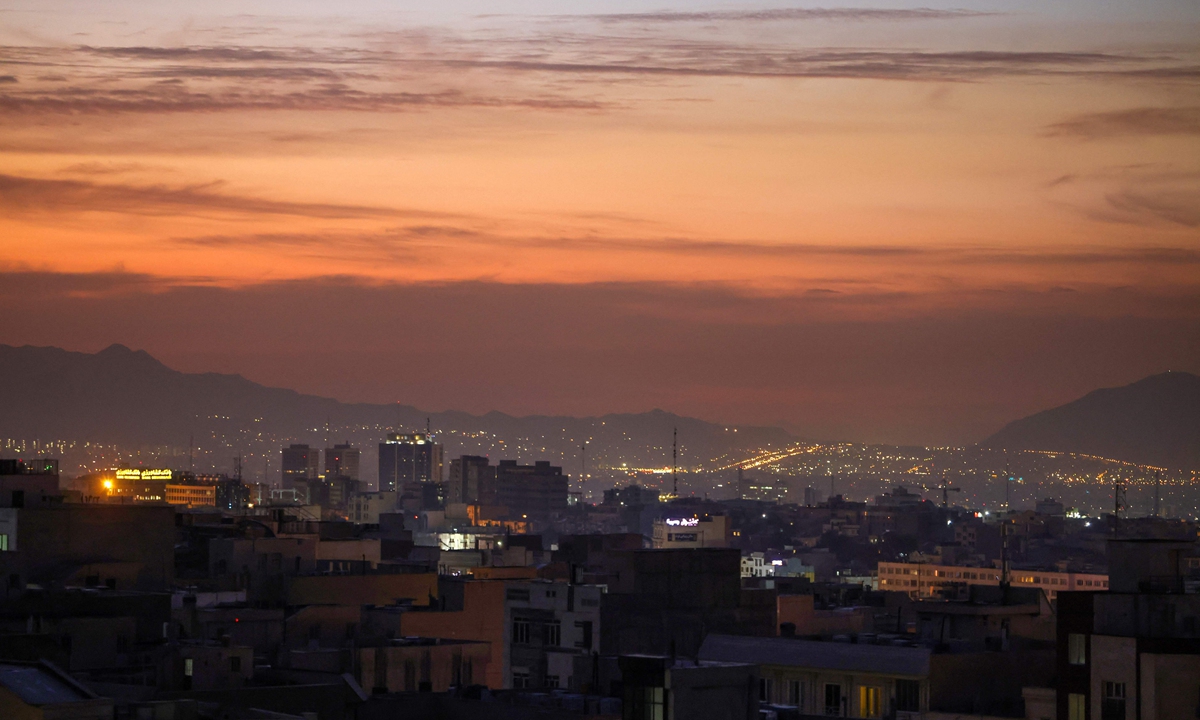Iran says damage ‘limited’ as Israel completes airstrikes; experts warn risks of full-scale regional war

Israel launched attacks on military sites in Iran on early October 26, 2024. Photo:VCG
Israeli overnight attacks on military sites in Iran captured global attention, prompting concerns over escalation of conflict and the potential for a full-scale regional war. Chinese observers said further conflict would not benefit anyone involved,as neither US, Israel nor Iran is prepared for a full-blown war.After three waves of strikes, Israel declared that the airstrikes on military facilities in Iran were complete.
Israeli military spokesman Rear Adm. Daniel Hagari said Saturday that the objectives of the overnight operation against Iran were successfully achieved. "The reprisal strike was completed, and its objectives were achieved," Hagari said during a press conference, according to Times of Israel.
Soon after Israel completed its overnight operation against Iran, Iran's military has confirmed Israeli strikes targeted military bases in Ilam, Khuzestan and Tehran provinces, resulting in "limited damage," according to Iranian National Air Defense Headquarters.
The spokesperson for Iran's Civil Aviation Organization said that flights resumed at 9 am local time and Iran's Ministry of Education spokesperson announced that schools nationwide are open on Saturday, and stated that "educational activities are proceeding as usual," according to Iran International News.
"The nation's integrated air defense system effectively intercepted and countered this hostile action, though limited damage was reported in select locations," the Iranian National Air Defense Headquarters statement read, adding that "the scope of the incident remains under thorough investigation."
On October 1, Iran fired approximately 180 missiles at Israeli targets. Tehran said the strikes were retaliation for the assassinations of several leaders of the regional resistance groups, among other things. In response, Israeli Prime Minister Benjamin Netanyahu said Iran had made a "grave mistake" and vowed retaliation, Xinhua reported.
The US has been trying to persuade Israel to control the scale of its retaliation in order to prevent the Middle East conflict from affecting electoral prospects. Targeted and restrained strikes by Israel on Iran both appease Israel's desire for revenge and achieve the effect of not overly provoking Iran, Liu Zhongmin, a professor at the Middle East Studies Institute of Shanghai International Studies University, told the Global Times.
Israel has gained significant benefits from the US, including security assurances related to the THAAD system. At the same time, Israel's core objective has been to deter Iran through targeted actions, Liu said.
Echoing Liu, Li Weijian, a research fellow with the Institute for Foreign Policy Studies of the Shanghai Institutes for International Studies, told the Global Times Israeli retaliation is more of a symbolic response. Li said neither US, Israel nor Iran is prepared for a full-scale war.
Judging from what have seen in the news, Israel launched the strikes cautiously, with careful consideration of the location, timing, and various scales involved in avoid of touching the energy and nuclear facilities of Iran, Li said.
Under the surface of a year of fierce war in Gaza, Israel has also been troubled with many tricky issues in terms of economy, and domestic matters, heavily relying on the US to provide military support, equipment, Li said.
Meanwhile, the current Iranian president is adopting a pragmatic approach, aiming to improve relations with the West, reversing the hardline policies that have contributed to international isolation, according to Li.
However, future conflict risks remain, Chinese observers said.
"If scripted strikes like today's continue, we may witness the potential re-emergence of conflict and greater crises. The question of how conflict management will be conducted in the future and how to avoid further escalation is something that the US, Israel, and Iran must consider," Liu emphasized.


